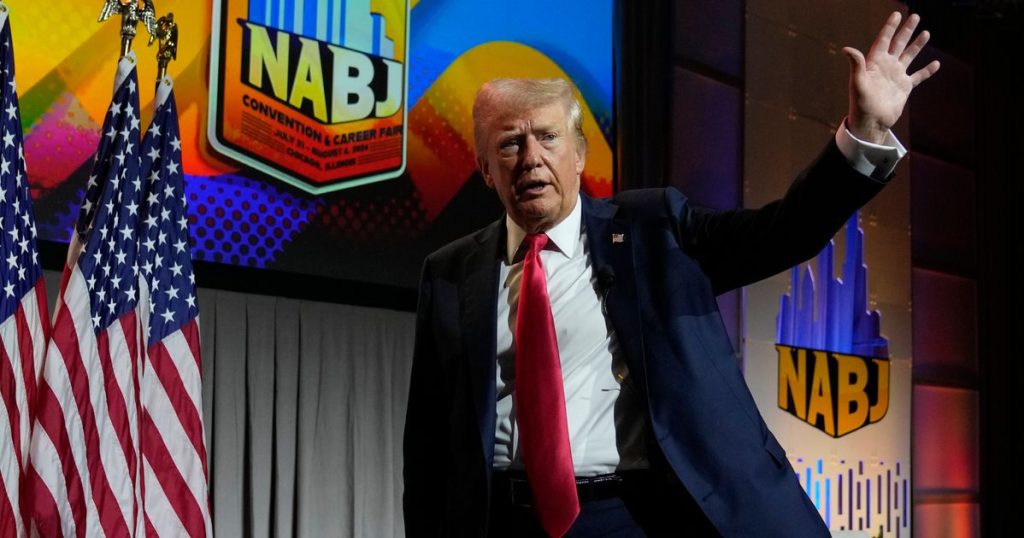Former President Donald Trump accused Vice President Kamala Harris of changing her identity and claiming to be Black in order to gain political advantage during a Q&A session at a convention for Black journalists in Chicago. Trump claimed that Harris was always of Indian heritage and only promoted her Indian background until a number of years ago when she happened to “turn Black.” Trump questioned if Harris was truly Black or Indian, leading to groans and boos from the audience. Harris, who is the daughter of Jamaican and Indian immigrants, has always identified as a Black woman.
When confronted by a reporter about recent attacks on Harris by Republicans who labeled her as a “DEI hire,” Trump asked for the definition of “DEI,” which stands for diversity, equity, and inclusion. In response to the question of whether Harris is only on the ticket because she is a Black woman, Trump falsely claimed that Harris hid her Black identity until it was politically beneficial, implying that she was not authentic in her identity. White House Press Secretary Karine Jean-Pierre defended Harris, stating that no one has the right to determine how someone identifies.
Trump’s track record of questioning his political opponents’ racial identities was highlighted, including promoting the “birther” movement against former President Barack Obama’s citizenship and spreading false claims about Harris’s citizenship. He also attacked former South Carolina Republican Gov. Nikki Haley earlier this year on similar grounds. Trump’s attendance at the NABJ convention, a nonprofit organization supporting Black media professionals, received backlash from attendees, prompting Washington Post columnist Karen Attiah to step down from her position as co-chair in protest.
The controversy surrounding Trump’s comments at the NABJ convention raises questions about the intersection of race, politics, and identity in today’s political landscape. The notion that Harris only claimed to be Black for political gain challenges the authenticity of her identity and undermines her personal experiences as a Black woman. Trump’s history of questioning the citizenship and background of his opponents further adds fuel to the fire, showcasing a pattern of behavior that seeks to delegitimize individuals based on their race or ethnicity.
The response to Trump’s comments from White House Press Secretary Karine Jean-Pierre underscores the importance of allowing individuals to define their own identity without outside interference. The idea that someone can only be viewed through a political lens based on their race or background is a dangerous precedent that detracts from meaningful dialogue and understanding in public discourse. The backlash against Trump’s appearance at the NABJ convention highlights the need for respectful and inclusive conversations around race, ethnicity, and identity in the political realm.
Ultimately, the incident involving Trump and Harris at the NABJ convention serves as a stark reminder of the ongoing challenges surrounding race and identity in American society. The attempt to diminish Harris’s identity as a Black woman and cast doubt on her background reflects a deeper issue of prejudice and discrimination that continues to persist in politics and beyond. Moving forward, it is crucial to promote inclusivity, respect, and understanding when discussing issues of race and identity, in order to foster a more equitable and compassionate society for all individuals.


